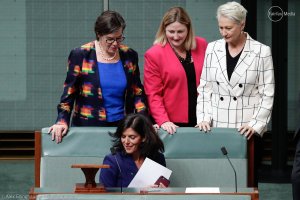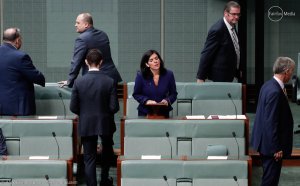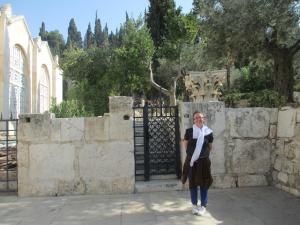Around the time former Attorney-General George Brandis was made High Commissioner in London, I read that the Liberal Party of Australia caucus is an estimated two-thirds conservative and one-third ‘classical’ liberal. The context was the creation of a Home Affairs ‘mega-ministry’, a kind of government-sponsored corporate raid. The new department subsumed some AGD responsibilities, and was generally interpreted as edging out the ‘moderate’ (classical liberal) Brandis to curry favour with ‘capital C Conservatives’ like former Queensland police officer Peter Dutton.
This omnishambles of a Liberal Party in turmoil, endlessly renting and kerning over factional power plays, instead of doing what the Australian public pays parliamentarians good money to do, has rolled through this Coalition government since 2013. When Liberal MP and member for the marginal electorate of Chisolm Julia Banks resigned to join the cross-bench on 27 November 2018, she cited colleagues putting personal political ambition before the national interest. Welcome to the Liberal Party, where aggressive pursuit of individual self-interest is codified as rational, and competitive, by the tenets of its very own ideology.
The day Banks stood to take her stand, legendary Fairfax photographer Andrew Ellinghausen posted a pair of images: one as she left the Liberals centres her among five men in blue and grey suits, all with their backs turned. The other chronicles her arrival to sit on the cross bench among three brightly-dressed independent women.
Both Brandis and Turnbull were regularly labelled, and probably were what passes for, ‘moderates’ in the neoliberal alt-right nativist populist Trumpist tribal world, or whatever white patriarchy is called these days. (I have written at length on the myth of moderate Malcolm, for instance here and here, and I warmly recommend this elegant analysis from Ben Eltham at New Matilda). The fact is that their purported moderation did not stop multiple women from reporting that Liberal men bullied them during the most recent leadership change, or, for that matter, men killing women every week, and often children too, in their own homes. Nor did it stop the gendered bullying in the parliament, or the media, or any other workplace or the many homes where it happens, or in public. But there hasn’t been much terrorism so that’s the main thing, according to the Prime and ‘Home’ Affairs minister.
The decline of liberalism in the Liberal Party, which is not worth saving
In this 2013 Fairfax profile, George Brandis is said to have read On Liberty by JS Mill in high school, which is the perfect cover for a deeply conservative worldview masquerading as commitment to individual liberty for all and thus – abracadabra – social equality. He later completed an honours thesis at the University of Queensland titled An interpretation of the ideology of the Liberal Party of Australia.
This is an odd title, because the Liberal Party of Australia houses two distinct ideologies. The most prominent lie the Liberal Party tells about itself – and there are many – is of a Broad Church that can and does accommodate both liberalism and conservatism. It doesn’t, and it can’t. Still, in 2018, those efforts by young George look commendable in a comparative sense. It is almost as though ‘moderate’ has become code for ‘has an ascertainable ideology that informs a coherent worldview, however narrow, naïve, and flawed’.
It can not be said that any parliamentarian among the estimated two-thirds-one-third ratio of conservatives to liberals in the Liberal Party caucus has lately enunciated his (sic) ideology. Or policy platform. Or Weltanschauung.
This is a party that campaigned against Labor Prime Minister Paul Keating (1991-1996) for having a vision for the future of the nation, mocking his platform as the vision thing. A party that offered up the alternative ‘platform’ of a relaxed and comfortable Australia from a man who says he enjoys Bob Dylan for his music not his lyrics… and who thinks saying this shit makes him quirky rather than a vacuous jerk paddling in an intellectual puddle.
In August 2018, this party produced, in yet another leadership coup that wasn’t, a failed figurehead who said he could smile and maybe show a different side if moved from Home Affairs to Prime Minister. That was his pitch. Like the electorate is his wife or something ‘yes, honey I’ve been very busy at work. I promise to smile a bit more.’
That is not a platform. If Peter Dutton decided to re-settle refugees detained on Nauru in Australia tomorrow, nobody – whether for or against the policy change – would care if he smiled or not. When his hour came, the performance of the most powerful conservative in the Liberal Party was egocentric nonsense.
Embedded values
The Broad Church euphemism persists for features it shares with common law theory. The authority of the common law, which is law every bit as much as legislation is law, rests on custom, longevity, and repetition. Common law is not only case law but also the doctrines, principles, rules and so on found in and applied by and handed down via those judgements.
If a legal principle has been around for a long time (in the judgements), and is derived from the social customs and conditions of the local population (as interpreted and applied by judges in Norfolk or Surrey or Kent, a tradition that gifts its name to district and circuit courts) and repeatedly cited and followed (by the judiciary), it has the authority of law. Sometimes, creative interpretation and application of legal norms becomes an accepted legal principle, sometimes in one jurisdiction and not another – or differently in different jurisdictions (Wilkinson v Downton [1897] 2 QBD7s3 57 is a famous example).
According to common law theory, this shows (is evidence? proves? On the balance of probabilities?) that the common law is robust and flexible and relevant, is capable of adapting and changing, to accommodate shifting social values. One obvious flaw in this model is the mono-cultural demography of its custodians, who are overwhelmingly drawn from the ranks of white barristers whose parents sent them to very expensive schools for boys. These are people who tend to have a wife who attends to life outside the law, like children, like bathtime and dinner and homework and birthdays.
This kind of demographic dominance works for corporations avoiding tax liabilities, or wealthy individuals shirking contractual obligations, or celebrities upset about how their craft or character is portrayed in a newspaper. The cast are mostly the same demographic as the judiciary, or in close proximity (maleness, whiteness), and the players have their exits and their entrances. Performing at their leisure or working hard for serious money? Maybe both – who can say?
The criminal law, in contrast, has a starkly different clientele to its practitioners. Prisons are full of poor people, black people, victims of crime and people who did not finish school and who survived child sexual assault, people with disproportionately high rates of mental illness and illiteracy. The lawyers and judges are not in these classes of person.
Some would say that this picture cannot be drawn without a neoliberal framework, and I don’t disagree. But the more I think about it, the more it seems to me that distinguishing classical from neoliberalism seems redundant. The tenets all look the same.
I was talking to a colleague and friend about data integrity recently, and specifically about those terms and conditions everyone is compelled to tick, which are basically caveat emptor, buyer beware. Data harvesting by tech giants, disguised by nonsense individual freedom and choice rhetoric, exist because neoliberal governments do not know what to do with behemoths like Facebook and Amazon. Those terms and conditions are the C21 equivalent of the perfect knowledge ascribed to consumers by free market theory.
All of which brings us back to that Broad Church of liberalism and conservatism, a euphemism perfectly suited to the Liberal Party, with its inherent dishonesty, phoney religiosity, and those values. Conservatives are very attached to custom, longevity and repetition. They will rationalise any old nastiness with ‘it has been this way for a long time’. Liberals, too, use this rationalisation, but even closer to their hearts are free market values like ‘rational’ self-interest and aggression disguised as ‘competition’. The fantastic fiction of this is that selfish pursuit of personal utility by individuals ipso facto produces aggregate social good.
No, it doesn’t.
Central organising principles
Recently I was invited to an Honours workshop because a star graduate, whose thesis I supervised, was giving a talk on getting his research published in an academic journal. For his conclusion, the student had constructed a case study in the form of three fictional judgements in the NSW Supreme Court of Appeal. He created a ‘constitutional trust’ as authority for the judiciary to not apply a law which abrogates fundamental common law principles (Serious Crime Prevention Orders, for the record). He did very well.
I went along, and added a few words about how I observed that his research really fell into place when he landed on his constitutional trust, which is not a real thing (it was meticulously researched and anchored in real law). Like students and everybody, researchers have different ways of learning and interpreting as we go about the knowledge business. For me, locating the central organising principle/s that found and shape whatever it is I am writing about – law, patriarchy, colonialism, etymology, citizenship, liberalism, conservatism – is the key. It unlocks. It opens the door.
For example, for a student using feminist analysis, it is useful to know that the central organising principles of patriarchy are domination and control. I learnt this from philosopher and novelist Marilyn French (Beyond Power: On Women, Men and Morality, 1983) as an undergraduate in the late 1980s. Many years later, the work of distinguished Professor Aileen Moreton Robinson (2004) showed me to comprehend patriarchy and white supremacy, in its Australian form in particular, in The possessive logic of patriarchal white sovereignty: The High Court and the Yorta Yorta decision.
Obvious as it sounds (now), etymology and semiotics fell into place for me as soon as I could articulate that language encodes values, that there is a reason for phrases like mother country, mother tongue. Lex, lexicon, words of the people, law of the land. In English, and under patriarchy, this means a mass of disprovable and thus dishonest assumptions underpin much communication, whether among monolingual native English speakers or everyone who communicates with us.
Similarly, common law theory came into sharp relief when I landed on the source of its authority in custom, longevity and repetition. In among the many intriguing and intelligent readings in law that have crossed my desk, are centuries-worth of gibberish theorising origins of law and sources of its authority. It takes the patience of a saint more saintly than the immersion-baptism fetishist Augustine of Hippo (354-430), or the religious violence apologist Thomas Aquinas (1225-1274), to wade through it all.
The set literature is dominated by men, so the proposition that human ideas spring from human brains, which are grown inside human bodies, something I have personally done three times, is not sufficiently male-centered. It takes effort to locate texts on intersectionality and critical race and feminist jurisprudence, by scholars like Kimberlé Williams Crenshaw and Carol Pateman. It also takes effort to birth and raise human beings with a mind of their own.
Ideology, and a polity lacking honesty in principle
Eventually, I arrived at the comparison between central organising principles of liberal and conservative ideology: meritocracy and primogeniture. Liberals claim that the distribution of power and wealth – political economy – is organised by merit. They think that stating the merits of those at the top of social hierarchy validly explains their position of power. This is meritocracy mythology. Conservatives, in contrast, think that birth into privilege – again, power and wealth – is a valid means of organising society, of determining who can exercise decision-making authority over the rest. This is primogeniture.
An ideology is the logic of ideas, the articles of faith underpinning specific policy positions and the codification of those policies into legislation. That legislation – laws – then impose conditions on, and threaten sanctions against, the subject population. Making laws is what governments do. So the coherence of the underlying logic, and ethic of the underlying values, is not immaterial. This is the why, and how, the conservative-liberal composition of the Liberal Party caucus produces irreconcilable ideological incoherence, and thus poor governance and therefore also bad law.
Meritocracy is demonstrably false. It is a myth built on lies, yet liberalism chooses to stick with its disprovable propositions rather than implement structural changes that would make it more real. To know the demographics of the executive levels in all our institutions – industry, politics, media, religion, whatever – and still believe in meritocracy requires belief in white male superiority, which is social Darwinist nonsense. White males dominate all our institutions because they are better at everything? Have you seen Barnaby Joyce on the telly?
The central tenet of conservatism, primogeniture, is relatively useful in that it carries explanatory power. Lots of executives, whether in the public service or universities or cabinet (for example), can be identified and explained by their inherited wealth, socio-positional power, and unshakeable belief that this qualifies them for high office. But neither conservatives nor liberals defend primogeniture anymore, or not so in so many words. Some openly defend British monarchy, but not that birthright is a valid basis for choosing who gets to govern over the population.
So Liberal ideology asserts an obviously wrong and morally dubious meritocracy mythology which its members claim explains existing hierarchical social organisation. Conservatives subscribe to a view which explains the hierarchy much more realistically – born to rule – but which is no longer socially acceptable to publicly defend.
Despite the ‘transactional costs’, funded by the Australian public, as Liberal Party MPs sort through their emotional attachment to basic and mostly unformed ideology, these standpoints are not intellectually irreconcilable. For instance, the Broad Church allegory can be understood in terms of the pivot to positivism attributed to Scottish philosopher and unreconstructed scientific racist David Hume (1711-1776).
What is, and what ought to be
Hume questioned whether there is a necessary connection between what is and what ought to be. He critiqued natural law philosophy for assuming, and not adequately explaining, the logical leap from lex talionis, law of the natural world, to how the social (man-made) world ought to be. This was not new of course, what is? Aristotle wrote of political justice as part natural part legal; Justinian had universal and civil law; Aquinas developed his typology around an eternal law from the heavens, a divine law on earth, and human law by society. Most of this thinking was directed at human exceptionalism, differentiating us from the beasts and creatures (etc), and the goal of placing us at the centre of the universe.
Conservatism and liberalism stem from these philosophies. Primogeniture explains how things are (our form of social organisation puts property-owning white males into positions of power, who deserve to rule), and meritocracy explains how things ought to be (positions of power should be held by those with merit, therefore the dominant group deserve their position). But ideological adherents refuse to flip their perspectives. Thinking that meritocracy produces the hierarchy we have ignores abhorrent bio-essentialist implications. Are white men from wealthy households innately better suited to governance? Genetically? No? But they dominate the executive. Why? Because primogeniture. Conservatives, meanwhile, feel compelled to not publicly mention that the dominance of white men from wealthy households is entirely consistent with their world view.
Again, these positions can be reconciled intellectually. Both can be explained by white patriarchy and just deserts theory, for example. Patriarchy seeks domination and control, including for its own sake. Just deserts theory says the ruling class, in this case by white men, are validly placed at the top of social hierarchy – deserving of the power they hold – whether on merit or by birthright. So, that was easy.
But in the Liberal Party, the problem is intellectual honesty, intellectual capacity, courage and integrity. Liberal Party politicians are not even game to attempt ideological coherence in their public pronouncements. They prefer simplistic slogans, message manipulation, outright lies, and varying levels of verbal bullying.
None of this is new either, of course. It can be traced to its tories-vs-whigs political ancestry (the English Civil War), to catholic-vs-anglican christian sectarianism (Henry VIII and the papacy) right through to the disgusting transactionalism of present-day performative religiosity by Morrison, Turnbull, Abbott and Dutton (Pentecostal, Anglican-turned-catholic, Catholic, and mason-like protestant).
They all do it. The point is not to legitimise faux-Christianity, but to point to the constitutive problem of the Liberal Party, which is the broad church lie. This is not an organisation which can accommodate differing ideologies. It is an organisation whose members will fight to the death over ideology alone, when most players do not even understand the ideology each is defending, because pursuit of self-interest is the only tenet they picked up.
Some say the Liberal Party is done and personally I do not care whether it is or not. Something will rise, phoenix-like, from its trash ashes. My kids and I have survived a helluva a lot of vicious Liberal Party policy, and will again. But if the Liberal Party is gone, I will be the first to dance on its grave. Good riddance, horrible people. May all your imputed dividends and negative gearing be abolished.


